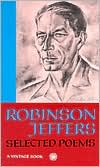

 |

|

The average rating for Selected Poetry based on 2 reviews is 4.5 stars.
Review # 1 was written on 2015-09-05 00:00:00 Harouri Houlet Harouri HouletAt first glance, poet Robinson Jeffers'born in 1887'might look like some kind of early beatnik or proto-hippie. An environmentalist, he wrote lyrically about the beauties of the California coast, and believed nature should be seen as the center of all; a seeker of truth, he was impressed by the personality of the theosophical "guru" Krishnamurti; a pacifist, he made himself highly unpopular by his opposition to World War II. Both environmental anarchist Edward Abbey (author of The Monkey Wrench Gang) and Zen poet Gary Snyder (inspiration for Kerouac's Japhy Ryder in The Dharma Bums) were his admirers, and Charles Bukowski once called him his favorite poet. He wrote long free verse poems with transgressive themes, such as bestiality and incest and family murder, and he lived with his wife and two children in a stone dwelling, "Tor House," which he built with his own hands. But Jeffers wouldn't have made a good beatnik, let alone a good hippie. He was no humanist, but instead'in a phrase he coined'an "inhumanist," who looked to nature as the center of everything and considered man to be too self-regarding and solipsistic to even experience beauty--at least without undergoing a radical shift of focus. He only admired Krishnamurti after Krishnamurti had rejected his own theosophical guru-ship, declaring truth to be a "pathless land," and he opposed war not because he loved or wished to preserve humankind, but because he despised human civilizations in general and feared the great damage its wars would do to the indifferent beauty of earth. The son of a Presbyterian minister and biblical scholar, from an early age Robinson Jeffers read the bible and studied the Greek and Latin classics, and each of his poems'whether long narrative or terse lyric'combine the fierce prophetic voice of Jeremiah, the majesty of Sophocles, and the withering contempt of Juvenal. It is a voice which awes and compels, but it is not always easy to like. The twenty pages of "Roan Stallion"--a little less than a fifth of the book--will give the reader some idea of his epic and dramatic narratives, but the rest of the collection is made up of the poems I prefer: his shorter lyrical, political and satirical pieces. Of these "To the Stone Cutters," "Shine, Perishing Republic," "Hurt Hawks," "Love the Wild Swan," "The Purse-Seine," "Original Sin," and "Skunks" are masterpieces'and ten pages like this--of monumental, flawless verse--are more than enough to make a master. But most of the other poems here are excellent too. Here is one of them: LET THEM ALONE If God has been good enough to give you a poet Then listen to him. But for God's sake let him alone until he is dead; no prizes, no ceremony, They kill the man. A poet is one who listens To nature and his own heart; and if he is tough enough, He can shake off his enemies but not his friends. That is what withered Wordsworth and muffled Tennyson, and would have killed Keats; that is what makes Hemingway play the fool and Faulkner forget his art. |
Review # 2 was written on 2012-02-10 00:00:00 Trevor Bates Trevor BatesWhen he was alive I paid very little attention to Robinson Jeffers. My attention to poetry was taken up with American poets who wove a tighter fabric of meaning or at least of implication: Wallace Stevens, Robert Frost, T. S. Eliot, Ezra Pound. But picking Jeffers up in 2011 I enjoyed and respected his verse. Early in this selection it is metrical and resonant. It has gut satisfaction. It is straightforward. He is resonant in denunciation. That's no small virtue. I think of 18th-century poets like Pope and Charles Churchill. As the years pass it wanders towards prose. In these years he suffered and expressed disgust at human behavior in the Second World War, and the loss of his wife and become more and more bitter. He tends to eulogize nature, not a pretty, but a strong, statuesque nature, not friendly but authoritative, particularly as geology and as raptors. He praises the violence in nature; it excites his imagination, but tends to deplore violence in people. As the years go on he tends to repeat himself, and some of his later poems seem like self-parodies. It is said that Robert Frost quipped of Jeffers, "It is wise to praise the hawk, but not too often." |
CAN'T FIND WHAT YOU'RE LOOKING FOR? CLICK HERE!!!